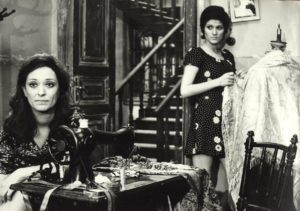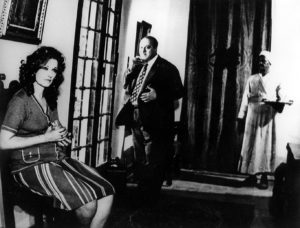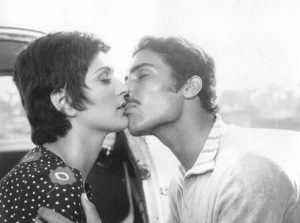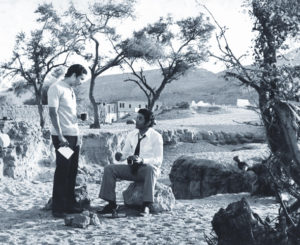The Sparrow
Directed by Youssef Chahine
Egypt | 1972
Egypt’s best-known auteur Youssef Chahine (1926-2008) never shied away from controversial topic-matter during his six decades of filmmaking. An expressionistic non-linear approach to cinematic storytelling made his internationally award winning feature films – thirty-six in total – unique.
The Sparrow (Al-Asfour), which was banned for two years after its release in 1972, was set against the backdrop of the 1967 Six-Day War. The film is composed of numerous subplots, moody close-ups and lesser characters who briefly become main ones and main characters who are soon forgotten or easily mistaken for someone else. Yet The Sparrow’s lack of a cohesive centre allows the viewer to be immersed in the sights, sounds and impressions of a fragmented society where all are sacrificed to corruption and broken promises.

At the film’s shifting centre is the search for a criminal mastermind, Abu Khadr, who never appears in the movie but is constantly talked about and hunted. He is responsible for the decimation of a factory in Upper Egypt and the theft of machinery by two trucks that periodically show up at important junctures throughout in the film. Where they are going remains a mystery. However, investigations by an enterprising journalist aided by a young policeman, Raouf (played by Salah Kabil), the adopted son of a prominent military official, uncover criminal ties to unnamed government officials. It is the same shady men at the top who then conspire with the police to ambush Abu Khadr.
Raouf’s half brother meanwhile sends letters from the military frontline in the Sinai and his voiceover provides some of the film’s background narration. The story then leaves the cheeky personalities of the rural countryside – a little boy insistent on getting to Cairo to feed the poor of the Al-Husseini mosque, or Fellinesque voluptuousness in black abayahs, female characters that embody earthly sensuality – and moves to the Egyptian capital. There, Raouf out of uniform begins a personal search of his own to find the friends of his dead biological father, a leftwing musician and activist. It is from this vantage point that the tragedy of the 1967 naksa (setback) unfolds. His fathers’ friends get caught up in wholesale fantasy about winning a war that is lost in record time and precipitates the real-life resignation of Gamal Abdel Nasser.
Although the focus of The Sparrow was the 1967 war, the film was banned on the eve of the 1973 Yom Kippur War for its critical perspective on the country’s politicians. Ironically this was the same year it won a prestigious cultural award in Egypt. ‘When it was banned,’ Chahine recalled in an interview, ‘I was very depressed, but fortunately it was not banned for long. The experience taught me that even if a film is banned for a while, eventually it will be released.’
 The idea for the short story that the film is based on came to leftwing writer Lotfi el-Khouly while he was in prison and heard the legendary Egyptian poet Fouad Negm, also in jail, recite his poem ‘Bahiya’. Chahine later gave that name to one of the female characters in the film. Eventually he asked Negm and his collaborator the blind Sheikh Imam to write the movie’s theme song that the characters also sing in the film.
The idea for the short story that the film is based on came to leftwing writer Lotfi el-Khouly while he was in prison and heard the legendary Egyptian poet Fouad Negm, also in jail, recite his poem ‘Bahiya’. Chahine later gave that name to one of the female characters in the film. Eventually he asked Negm and his collaborator the blind Sheikh Imam to write the movie’s theme song that the characters also sing in the film.
In Cairo, Raouf rents a room in a boarding house belonging to Bahiya (Mohsena Tawfik) where friends of his dead father congregate. The landlady’s daughter could have been the cause of the film’s unrealised love conflict between Raouf and the journalist. Her affair with Raouf culminates in a steamy love scene which was quite racy even by the film standards of 1970s Cairo. Her modish 1960s dresses and cute hairstyles are in sharp contrast with the contemporary styles adopted by Egyptian actresses today.
The Sparrow explores what was a defining defeat for the Arab world – a cause of disillusionment that permeated all levels of Arab culture and society. Seeing it again now serves as a timely reminder after the disappointments of the so-called Arab Spring or awakening. For Safar’s artistic director Omar Kholeif, the subject of the film has resonance today. He explained, ‘The moment of the Six-Day War is incredibly important to re-invoke at this time because it was the death of the Pan-Arab ideal. What we saw in 2011 was the resurgence of a pan-Arab language or notion of it, which by 2014 has become more fractured than ever with ISIS, Libya, Syria, Palestine, Gaza, Egypt.’
Chahine is considered one of the great Arab film directors. As the Guardian’s film critic Nick Bradshaw writes, ‘His abiding worth, inside Egypt and out, has been in his outspoken expression of the conscience of his country. He took on imperialism and fundamentalism alike, celebrated the liberty of body and soul, and offered himself warts and all as an emblem of his nation. Egypt’s modern history is etched in his life’s work.’ As vexing as The Sparrow may often be, it remains a seminal film that adds complexity and vivacity in all its shades to an important historical moment.
– Malu Halasa
London-based journalist writer and editor Malu Halasa is our writer-in-residence. Keep your eyes peeled for her posts in the run-up and during the festival.
For more information and to book tickets, please click here.



